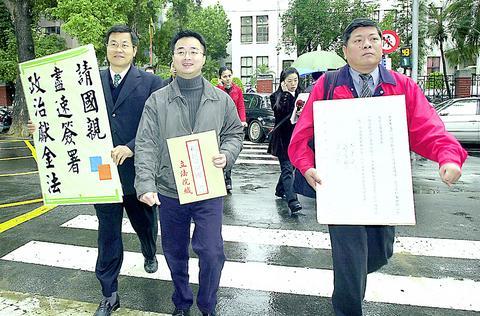Deputy secretary-general to the president Chen Che-nan (
"I met Chen Yu-hao three times in 2002. The first time was at a restaurant, where a friend introduced us," Chen Che-nan said at a news conference at the Presidential Office.

PHOTO: LUO PEI-TEH, TAIPEI TIMES
"The other two meetings were at the Presidential Office, where Chen Yu-hao explained that he did not transfer capital to invest in China while leaving huge debts in Taiwan. We did not discuss donations at any of the meetings, and I have neither transferred donations for Chen Yu-hao to the president nor accepted his money," Chen Che-nan said.
He said that Chen Yu-hao's asser-tions had a political motive.
Over the past five days opposition parties have held several press conferences accusing Chen Che-nan of involvement in financial scandals. In response to their claims, Chen Che-nan authorized Presidential Office spokesman James Huang (
On Thursday some Democratic Progressive Party (DPP) legislators asked Chen Che-nan to face the media in person to clearly explain whether he had made any deal with Chen Yu-hao.
At yesterday's press conference, Chen Che-nan denied all the claims against him, including allegations that he had met Chen Yu-hao at the China Development Group's private club and that he had accepted money from Chen Yu-hao at his residence.
"I am stating frankly and honestly that we do have a close relationship, but that I never took his money," Chen Che-nan said.
Meanwhile, Vice President Annette Lu (
"The problem is not political donations as such, but how to regulate the donation process, and placing all politicians under the scrutinizing mechanism," Lu said in a TV interview last night.
"The opposition parties, including the Chinese Nationalist Party (KMT) and the People First Party (PFP), attack others for taking money, but at the same time do their best to obstruct the DPP's plans for passing the Political Donation Law," Lu said.
"How could those two parties dare to point fingers at us?" Lu said.
Commenting on a report in a Chinese-language newspaper on Wednesday that she had also received donations worth NT$55 million from Chen Yu-hao's group, Lu criticized the media's performance and asked the media to restrain itself.

A preclearance service to facilitate entry for people traveling to select airports in Japan would be available from Thursday next week to Feb. 25 at Taiwan Taoyuan International Airport, Taoyuan International Airport Corp (TIAC) said on Tuesday. The service was first made available to Taiwanese travelers throughout the winter vacation of 2024 and during the Lunar New Year holiday. In addition to flights to the Japanese cities of Hakodate, Asahikawa, Akita, Sendai, Niigata, Okayama, Takamatsu, Kumamoto and Kagoshima, the service would be available to travelers to Kobe and Oita. The service can be accessed by passengers of 15 flight routes operated by

GIVE AND TAKE: Blood demand continues to rise each year, while fewer young donors are available due to the nation’s falling birthrate, a doctor said Blood donors can redeem points earned from donations to obtain limited edition Formosan black bear travel mugs, the Kaohsiung Blood Center said yesterday, as it announced a goal of stocking 20,000 units of blood prior to the Lunar New Year. The last month of the lunar year is National Blood Donation Month, when local centers seek to stockpile blood for use during the Lunar New Year holiday. The blood demand in southern Taiwan — including Tainan and Kaohsiung, as well as Chiayi, Pingtung, Penghu and Taitung counties — is about 2,000 units per day, the center said. The donation campaign aims to boost

ENHANCING EFFICIENCY: The apron can accommodate 16 airplanes overnight at Taoyuan airport while work on the third runway continues, the transport minister said A new temporary overnight parking apron at Taiwan Taoyuan International Airport is to start operating on Friday next week to boost operational efficiency while the third runway is being constructed, the Ministry of Transportation and Communications said yesterday. The apron — one of the crucial projects in the construction of the third runway — can accommodate 16 aircraft overnight at the nation’s largest international airport, Minister of Transportation and Communications Chen Shih-kai (陳世凱) told reporters while inspecting the new facility yesterday morning. Aside from providing the airport operator with greater flexibility in aircraft parking during the third runway construction,

MORE FALL: An investigation into one of Xi’s key cronies, part of a broader ‘anti-corruption’ drive, indicates that he might have a deep distrust in the military, an expert said China’s latest military purge underscores systemic risks in its shift from collective leadership to sole rule under Chinese President Xi Jinping (習近平), and could disrupt its chain of command and military capabilities, a national security official said yesterday. If decisionmaking within the Chinese Communist Party has become “irrational” under one-man rule, the Taiwan Strait and the regional situation must be approached with extreme caution, given unforeseen risks, they added. The anonymous official made the remarks as China’s Central Military Commission Vice Chairman Zhang Youxia (張又俠) and Joint Staff Department Chief of Staff Liu Zhenli (劉振立) were reportedly being investigated for suspected “serious